- Home
- Franklin Horton
The Borrowed World (Book 3): Legion of Despair Page 9
The Borrowed World (Book 3): Legion of Despair Read online
Page 9
“I’m going to kill you,” Boyd said groggily, reaching to slide his hand into his pocket for the gun.
Alice scanned the debris that their fight had knocked from the wall. To her left, she saw a cast iron skillet, a weapon of lore among housewives for centuries. While Boyd tried to untangle his hand from his pocket, she brought the heavy skillet down on his head over and over until he stopped moving. She slumped to the floor, exhausted and bloody. She noticed his chest still moving. She could not leave him alive. She pulled Boyd’s hand from his pocket and found the gun he’d been trying to reach. She clutched the revolver in her shaking, blood-stained hands, aimed for his face, and pulled the trigger.
Chapter 6
The Valley
Russell County, VA
Buddy sat at his kitchen table. There had been a time in his life when sitting at this table was the highlight of his day. It was the place where he, his wife, and his daughter reconnected at the end of a day of work and school. It was where he ate breakfast with his little girl before school. Those were some of the best memories of his life. Across from him, at the place where she always sat, his wife smiled at him from a framed photograph. When Rachel quit coming home and having dinner with him, he’d placed the photo there for someone to talk to.
Buddy had not slept that night. He couldn’t. To try to sleep with all that had happened seemed almost a blasphemy. Instead, he worked. Buddy had been a smoker for most of his life. His wife had also smoked up until she got sick that last time. When she quit, Buddy quit. He didn’t wean himself off. He just laid them down and never picked them up again. Since they both always bought them by the carton to get the best price, there were several dozen packs of cigarettes still laying around their house. Buddy had gathered them all last night.
Over the course of an hour, he sat with a razor blade, slitting each cigarette open and extracting the tobacco. When he’d done them all, he had what appeared to be about a quart jar full of tobacco. He’d dumped that into an old soup pot with enough water to cover it up and boiled it, adding more water when he felt like he needed more. After about two hours, he used a slotted spoon to scoop out all the tobacco into the trash. He threw the spoon away when he’d gotten it all. He boiled the mixture until all that remained was a dark, sticky syrup, then he set it aside to cool.
He went back to the kitchen table and dumped out some of the hundreds of pain pills that had been prescribed for his wife. There were a variety of tablets, all of strengths sufficient to bring rest to the pain-wracked and cancer-stricken. Buddy spread the pills into a single layer on a cookie sheet.
When his wife passed, Buddy hid the pills in a rusty old toolbox out in his storage building. His daughter had not started using drugs at that time, but he didn’t want them in the house. He was concerned that Rachel might use them to commit suicide because of her sadness at the loss her mother. That she would ever enjoy taking a pill designed to ease the suffering of a cancer patient had never occurred to him.
Over the last few months he’d seen indications that she had been looking for them. He would come home from somewhere and find things out of place, a drawer not shut completely, or the closet door left cracked open. He suspected that it was the pills she was looking for. Whenever he checked the toolbox, they were still there. When he realized she had started looking for them, he considered flushing them down the toilet just to keep them out of her hands, but he didn’t. He suspected that he hung onto them only because he wanted to maintain an easy way out for himself just in case his own suffering became too much.
He went to his garage and got the respirator mask he wore when he sanded paint and donned it, along with stout rubber gloves. He removed the soup pot from the stove and placed it beside the cookie sheet of pain pills. With a toothpick, he placed a single drop of the nicotine syrup on the back of each pill. That would be all it took. Buddy remembered folks he knew as a child getting the “tobacco sickness” from picking wet tobacco. What they were really suffering from was nicotine poisoning. In its concentrated form, which Buddy had spent the night producing, a single drop would produce central nervous system depression and eventually respiratory failure.
“Live by the pill, die by the pill,” he whispered.
Buddy set the pills aside to dry. In front of him lay a cleaned and oiled Colt 1911. Although the weapon had never been issued to him in Vietnam, he’d learned to maintain and shoot the weapon while in the Marine Corps. He’d bought one for himself when he returned to the world and got a steady job. Despite the fact he was not really a gun person, he owned several. To him, they were tools. He had no desire to collect or covet them. He just wanted them available if he needed them. In the America he knew, having a gun in the house was like having a car in the driveway, a flashlight in the junk drawer, and a Bible in the living room.
The yellow box of Western Super-X rounds was so old that that the paper felt like the worn leather of an old wallet. The 1911 had two seven-round magazines, which he understood to be a bit smaller than the capacity of more modern handguns. The only holster he’d ever owned for the weapon was a leather Bianchi shoulder-rig that allowed him to carry the weapon under one arm and a spare mag under the other. Buddy slid the holster on and spent a few minutes straightening everything out. Once he had the holster squared away, he shrugged on a flannel shirt over his t-shirt to see if everything was concealed properly. It was.
He picked up the handgun from the table, popped a magazine into the weapon, and chambered a round. Then he ejected the magazine and replaced the round that he just used from the clip, topping it off. He put the magazine back in the weapon again. He took his flannel shirt back off and slid the weapon in the holster. After snapping his spare magazine in the leather case on the other side of the rig, he dumped out ten spare rounds from the box and dropped them into his pants pocket.
Buddy wasn’t sure what he was going to do today. He didn’t care if he died, but he didn’t want to die until he had carried out his one objective. That was to kill the man who killed Rachel. He briefly wondered if he should take more weapons. The Marines had also trained Buddy to fight with a knife, and the only fixed-blade knife he ever owned was the one they’d trained him on – a Ka-bar fighting knife. He retrieved the knife from the top drawer of his dresser, removed the knife from the sheath, and examined the edge in the light. It would do.
He got a roll of electrical tape and taped the sheath upside-down against the pistol holster. It would not interfere with drawing the pistol but it would be readily available and concealed should he need it.
He went to the bedroom and stood in front of the dresser, looking at himself in the mirror.
“Son, you almost look like a fucking Marine,” he said aloud. “Almost.” Someone had said that to him a long time ago in another life.
That gave him an idea, and in fifteen minutes he looked a damn sight closer to being a Marine again. Buddy had been blessed with a metabolism that had kept him roughly around the same size for most of his life. Once he’d dug them out of his old footlocker, Buddy had been able to slip right back into the Marine fatigues he’d worn in Vietnam. The pants were olive drab, worn with an olive drab t-shirt when he’d been there. He’d assumed the pants would be dry rotted but they weren’t. He even had his jungle boots, although they were stiff from being mashed up in the foot locker with other stuff. If he was going to war today, he might as well dress the part.
Simply lacing those boots back onto his feet brought back a flood of memories. He’d been a single, young man in that war, unaware of where life would take him if he ever made it home. Had he known the pain that he would face with the loss of his wife and daughter, he wondered if he might have been better off dying there in the jungle mud. If he could have looked forward in time and seen the blackness that awaited him, he might have taken more chances and volunteered for the suicide missions, as some men had done. If he had done that, though, he would have never had the happy moments. Maybe there would be a day when the good times weren
’t so bound to the sad times, though he couldn’t imagine how he’d get there.
Buddy looked at himself in the mirror, dressed again like the Marine he’d been nearly fifty years ago. He was startled, both that he was so old and that the war had been so long ago. Until he married, the war had defined him. It was his only story, his only experience. When they were with him, the presence of his wife and daughter had pushed the war further back into the past. He looked at his face and saw that he was an old man now. When he looked harder and met his own eye, he saw in those eyes that he was not just an old man today, he was also the angel of death.
*
The creature that had dumped his daughter like trash lived in a section of the county known as Macktown. He lived in an old white farmhouse that had once belonged to his grandparents, according to what Rachel had told him during a rare, talkative moment. The house was in ill-repair, with peeling paint and plastic-covered windows. The yard was waist-high with weeds that were never cut, despite three mowers sitting there idle. A muddy trail led from the driveway to the front door.
About a quarter-mile before he reached the house, there was a wide spot at an intersection. Buddy parked there on the gravel shoulder, not wanting to pull in the driveway and announce himself. He left the truck sitting there with the keys in the ignition. At this point, he didn’t care if someone stole the truck or the gas. He functioned with single-minded determination. There was only the moment and nothing else. The moment was about one thing. It was about death.
He walked the shoulder of the lined blacktop in his fatigues. The stiff boots rubbed his feet in all the wrong places. Though there had been a day when he’d done thirty-mile patrols through mud in those boots, those days were long gone. He’d been a tough bastard, made tougher by life in the jungle. The pain in his feet was lost in the greater sea of pain within him.
As he came upon the house, he could not immediately tell that it was occupied. In its overgrown condition, the stately old house loomed wild and unkempt on the roadside. The teal Camaro was there, as were several other beat-up vehicles. There were also a few mopeds and bicycles, the preferred transportation of those that had lost their driving privileges. He stood still by the road, listening. Some windows were open and he could hear loud talk that came unobstructed across the silence of the day. With no power, what else could people do? A month ago they’d have been blaring AC/DC from a stolen CD player. Now they just had to enjoy each other’s conversation.
He hoped that one of those people inside was the one he came for. His plan was a simple one. He walked from the road through the grassy parking area and to the muddy path that led to the door. Seeing no one in the yard or in the windows, he continued toward the front door, carefully placing each foot as he climbed the painted green steps so that he wouldn’t make too much noise and alert them.
Breaching the door was simple, since it wasn’t even locked. He turned the knob and he was in. Buddy had assumed that this might be the case in a house where people were constantly coming in and out, only staying long enough to get high or buy their drug of choice. He eased the door closed behind him and floated down the hall like smoke. Approaching the large, high-ceilinged room that had probably once served as a parlor, Buddy knew that this was where everyone was. All of the voices rolled from there and down the hall toward him. He pulled his pistol and stepped though the sliding pocket doors.
All conversation immediately came to a stop. The presence of a man with a gun could have that effect on people.
The man Buddy had come to see was sitting in a threadbare wingback chair across the room. He was smoking a joint and looked at Buddy with red, angry eyes. “Who the fuck are you? G.I. Joe?”
There was some laughter. Buddy considered replying with a gunshot, but he had a plan to follow and he was going to stick to it. He kept his pistol on the man, meeting his eye, waiting to see if recognition dawned on him. Buddy assumed there was no room inside himself for more anger, but he was wrong. The man’s lack of recognition made him swell with a cold fury.
“You don’t recognize me?”
The man leaned forward and set the joint in an ashtray. His forearms were roped with muscle. It looked like his preferred poison was steroids. He raised his eyes, slowly blew out smoke, and stared at Buddy again. A look crossed his face and he relaxed back into his chair like a king holding court from his decrepit throne.
“You that chick’s dad?” he asked.
The .45 boomed and the arm of the chair erupted into a cloud of bloody spray and wool padding. The man cursed loudly, hugging his damaged hand to his chest, blood pouring steadily from where the hollow-point round had severed two of his fingers.
“Wrong fucking answer,” Buddy said.
“Rachel’s dad,” the man corrected, grimacing and forcing himself to say the words clearly. He leaned forward and pulled a wadded bandana from the coffee table, gently wrapping his damaged hand. “What the fuck do you want with me?”
“I don’t have anything to do with this,” said a scrawny man, scooting forward on the couch. He wore a tank-top and was missing his teeth. “This ain’t my fight. I’m getting the hell out of here.”
“Stay where you are,” Buddy ordered. “Ain’t nobody leaving, yet. You move, you die too.”
“What do you want?” the bleeding man repeated, his voice louder.
Buddy sighed, fighting to control his emotion. He’d never voiced what he wanted. He didn’t dare. “What I want is my little girl back,” he said. “And you can’t make that happen.”
The man in the chair groaned, the shock of the trauma starting to wear off and the ache of his injury starting to move in. “I didn’t make her take that shit. She did it of her own free will.”
Buddy shook his head. “Does it matter? The end result was still the same. The part I cannot forgive is how you dumped her out at the ER like you were disposing of a deer carcass at a roadside dump. You’ve left me only one option.”
“What’s that?” the man asked through clenched teeth.
“To kill you,” Buddy stated.
The man somehow managed to snicker. “You really think that all these people are going to sit here and let you kill me? Without me, they got no dope and they can’t live without it. They can’t live without me. You’re outnumbered. There’s more people here than you got bullets.”
Buddy looked around. There were nearly a dozen people sitting around the dim room. Men, women, some respectable looking, and some pure trash. He figured most had some kind of weapon on them. The man was right. If he went to reload, they’d kill him. Thankfully, he had a plan.
“They’ll not likely do anything,” Buddy said.
“You sure about that?” a man asked.
He looked like a biker, wearing a leather vest, leather gloves with no fingers, and filthy jeans. He had a short length of chain slung around his neck. The ends of the chain hung at chest-level, a pair of fighting knives hanging from each. Of all the men in the room, he was the only one to fear. He knew how to fight. He liked to fight. Buddy could tell all those things, so he killed him without another thought.
Not interested in wasting any more time on a pissing contest, Buddy used his free hand to reach into his shirt pocket. He withdrew two amber pill bottles, something that instantly had the attention of everyone in the room.
“My wife died of cancer,” he said. “I’ve been meaning to get rid of her medications but I just never did. There’s a hundred OxyContin in each of these bottles. She died before she ever opened these.”
Buddy looked around the room. The only eyes not glued to the medicine bottles were those belonging to the man across the room. He was still looking at Buddy, curious about what was going to happen. He probably suspected that Buddy was going to offer the pills as payment for one of his associates turning on him and killing him.
That was not Buddy’s plan. He turned to the open window and threw both bottles outside. The reaction was instantaneous. People threw themselves toward the window, d
iving across each other, scrambling and scratching to get to the pills. They had no more control over their actions than Buddy had over his. No one came toward Buddy, though, preferring the window to the door since using it meant passing within reach of the armed man. Outside, Buddy could hear fighting and yelling. There were gunshots and screams. He didn’t even look in their direction.
He met the eye of the man sitting across the room from him. He could not wipe the image from his head of his daughter getting into that man’s car and leaving with him that last time. The man sensed that death was imminent and began looking to each side, seeking an exit. Before he could find one, Buddy crossed the room and struck him across the face with the .45, knocking him out cold.
*
The man was awakened by a searing pain. He screamed and writhed. He was on his stomach and felt a pressure on the back of his legs that prevented him from moving. He twisted his neck around and looked over his shoulder in time to see Buddy draw a long knife across the back of his ankles. He screamed again and bucked hard enough that Buddy stepped off him and let him flop around the floor.
“What the fuck did you do to me?” he asked, sobbing.
“Cut your Achilles tendons,” Buddy said. “Can’t have you going anywhere.”
The man tried to raise himself with his arms and crawl away but his arms would not cooperate.
“Your arms won’t work,” Buddy said. “I cut the biceps. Somehow you slept through that.”
“You’re a sick bastard!” the man cried. He continued to move about, unable to find any position that eased the pain in his limbs. He tried to get up again, his hands and feet curling uselessly under the weight of his body. He sobbed in horror.

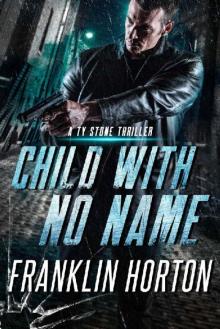 Child With No Name
Child With No Name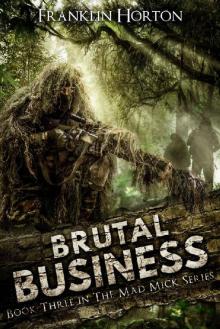 Brutal Business: Book Three in the Mad Mick Series
Brutal Business: Book Three in the Mad Mick Series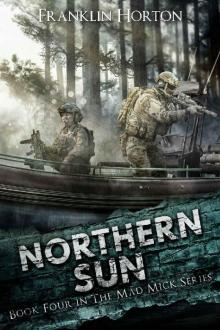 Northern Sun: Book Four in The Mad Mick Series
Northern Sun: Book Four in The Mad Mick Series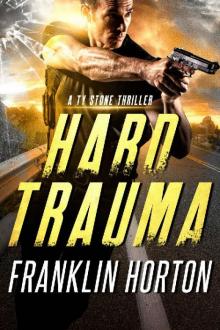 Hard Trauma
Hard Trauma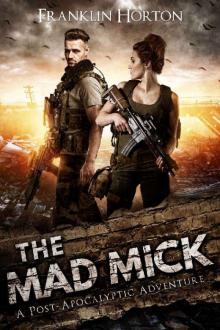 The Mad Mick: Book One of The Mad Mick Series
The Mad Mick: Book One of The Mad Mick Series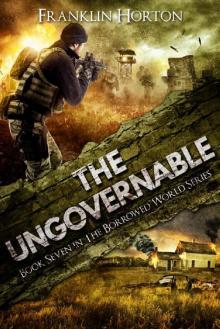 The Ungovernable
The Ungovernable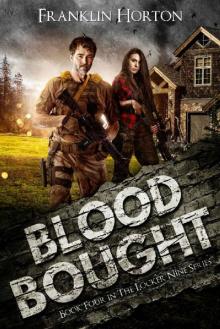 Blood Bought: Book Four in The Locker Nine Series
Blood Bought: Book Four in The Locker Nine Series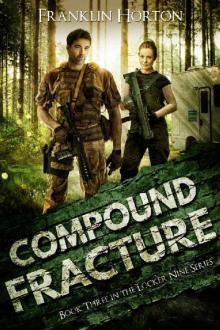 Compound Fracture
Compound Fracture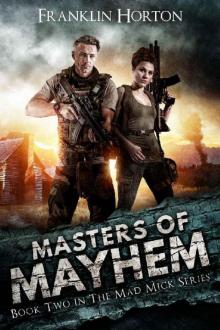 Masters of Mayhem
Masters of Mayhem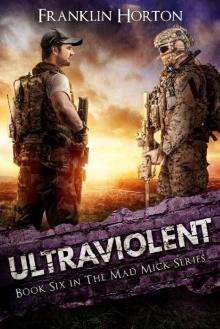 Ultraviolent: Book Six in The Mad Mick Series
Ultraviolent: Book Six in The Mad Mick Series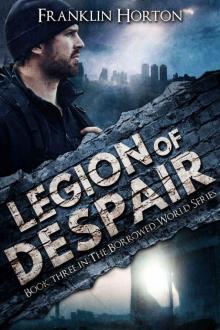 The Borrowed World (Book 3): Legion of Despair
The Borrowed World (Book 3): Legion of Despair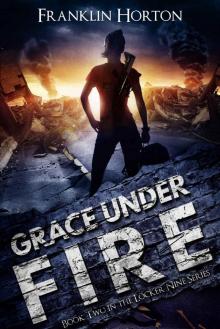 Grace Under Fire: Book Two In The Locker Nine Series
Grace Under Fire: Book Two In The Locker Nine Series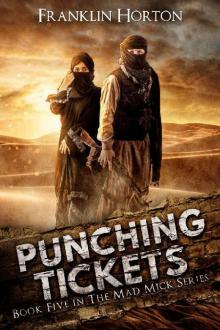 Punching Tickets: Book Five in The Mad Mick Series
Punching Tickets: Book Five in The Mad Mick Series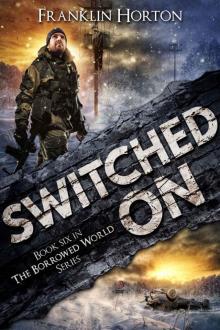 Switched On: Book Six in The Borrowed World Series
Switched On: Book Six in The Borrowed World Series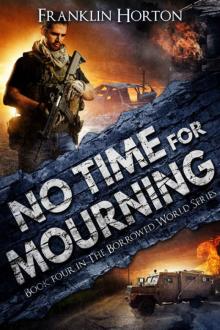 No Time For Mourning: Book Four in The Borrowed World Series
No Time For Mourning: Book Four in The Borrowed World Series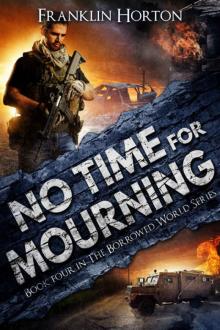 The Borrowed World (Book 4): No Time For Mourning
The Borrowed World (Book 4): No Time For Mourning Random Acts
Random Acts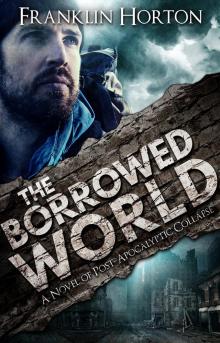 The Borrowed World: A Novel of Post-Apocalyptic Collapse
The Borrowed World: A Novel of Post-Apocalyptic Collapse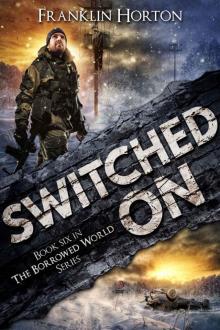 Switched On
Switched On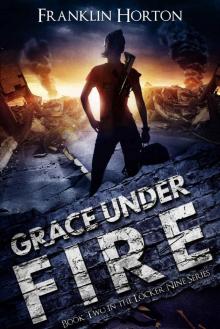 Grace Under Fire
Grace Under Fire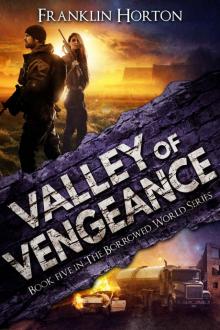 Valley of Vengeance: Book Five in The Borrowed World Series
Valley of Vengeance: Book Five in The Borrowed World Series